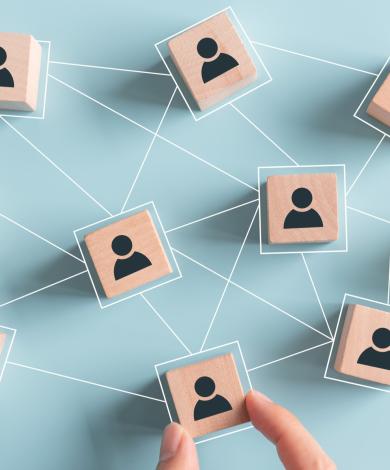Given it has been six months since I joined Emergency Nutrition Network, now seemed a good time to pen my reflections - not so much as a story of my first 200 days as the new and first ENN CEO, but more as a little insight into the impact the organisation has had on me.
The immediate attraction of ENN is in its purpose. That purpose is clear and inspiring, and it can be found in the name which reflects all we do. However, it is the commitment to excellence in every action and intervention and the pursuit of change alongside and for others, that stands out and has massively impressed me.
Commitment to implementation with networks of peers, also in the name, reinforces cohesion and catalyses greater collective outcomes, whilst allowing knowledge and learning to ripple out beyond our immediate collaborators as they work with their colleagues and partners across the globe. ENN contributes to the outcomes of these networks by facilitating their convening, facilitating the collective identification of systemic gaps and opportunities in the prevention and treatment of malnutrition and brokering agreement of priorities for further action. ENN helps facilitate the allocation of roles in carrying out the research, the analysing of evidence, dissemination of learning and bringing concerted influence to bear where it can bring the greatest change. It also directly contributes to these processes through its own research and analysis as well as through our renowned publications and platforms (Field Exchange and en-net) that gives voice to and connects practitioners, enabling them to learn and influence the system in their own way.
As humanitarian funding now resources less than 50% of the cost of global aid needs - and that amount is falling - we are obliged to look at long term return. I am convinced it is only by bringing about a thousand small shifts in the way we understand, prevent, and treat malnutrition that the cost curve of the humanitarian caseload will bend to meet the slower growth in available resources.
ENN has a phenomenal team of dedicated technical experts who enhance the performance of networks that have global influence, and yet it operates on a budget smaller than that of many international NGO provincial projects! Systems thinking is hardly new but the importance of independent organisations like ENN, explicitly focused on collective understanding, practice and policy, are more urgently needed than ever.
My colleagues at Emergency Nutrition Network are passionate, qualified and trusted to deliver these roles and they are generously backed by donors and partners that include governments (Ireland and USA), foundations (such as Bill & Melinda Gates Foundation, Eleanor Crook Foundation, and Waterloo Foundation) the agencies who make up the networks (Save the Children, GOAL, UNICEF and WFP to name a few) and academic institutions (Jimma University in Ethiopia and London School of Hygiene and Tropical Medicine) amongst others. Watching these networks of people and agencies come together and deliver system shift has been a wonder and a joy to behold.
In the short time I have been with ENN, my colleagues and their collaborators have more specifically had a number of achievements, only three of which I’ll call out here;
At the helm of the MAMI Global Network, ENN continues to help shape and share service innovation for at risk infants under 6 months, connecting practitioners around the world, supporting country chapter development in India, Uganda and Ethiopia and most recently launching, in response to popular demand, a regional Francophone interest group;
ENN has worked up front and behind scenes to support guidance development, facilitating, negotiating and brokering across UN and NGO processes and working groups including the WHO Wasting Guidelines update (as an Observer) and the Global Nutrition Cluster Technical Alliance working groups (providing thought leadership, oversight and co-chairing several), and coordinated the WaSt Technical Interest Group (TIG) of over 40 global experts in child growth, nutrition and epidemiology, formed to examine the complex relationship between wasting and stunting that, when combined, affect the long term health prospects of many millions of children under 5 years;
UNICEF’s very recent report Undernourished and Overlooked: A global nutrition crisis in adolescent girls and women has had the strong influence of ENN’s catalytic work on women’s and adolescent nutrition, particularly in our synthesis of evidence to date, and identifying the key gaps in research and programming and in opportunities for relatively quick wins on women and adolescent nutrition.
It is an extraordinary model, with extraordinary outcomes.
Not that it is all easy to keep up with. I am still getting to grips with all ENN’s idiosyncrasies and matching them with my own norms and expectations, conditioned over 30 years of working for mainstream, mainframe, implementing agencies. I wonder and wrestle with the humility, modesty, informality, frugality and generosity of ENN in equal measure.
There is much to do; 2023 is a strategy year and we have strengths, weaknesses and elephants to confront but I am confident that a little research, convening, learning and knowledge management with our great people and networks, will bend our own system to meet our demands so we continue to serve others for as long as we are needed.

